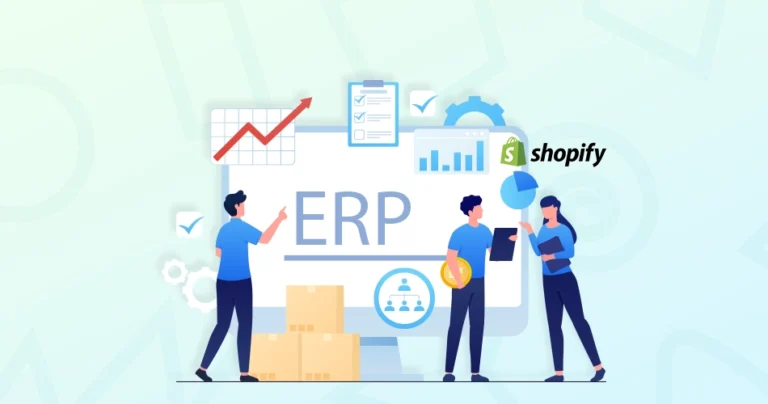Shopify merchants often struggle with scattered data, such as orders in Shopify, inventory in spreadsheets, and accounting elsewhere. That disconnect slows decision‑making and creates errors in inventory, fulfillment, and finance.
Shopify ERP integration connects your store to an ERP, keeping order, inventory, customer, and financial data synchronized in near real time. This reduces manual data entry, speeds up fulfillment, and improves reporting accuracy.
This guide explains Shopify ERP integration, how it works, common methods, popular systems, and main benefits and challenges.
What Is Shopify ERP Integration?
Shopify ERP refers to the integration of your Shopify store with an Enterprise Resource Planning (ERP) system. Essentially, it’s about connecting your online store to a comprehensive software solution that manages your business’s various aspects.
Think of an ERP system as the central nervous system of your company. Instead of managing these functions in isolation, Shopify ERP integration automatically aligns your commerce data with your ERP system. It handles crucial functions like:
- Inventory Management: Keeping track of stock levels, automating reordering, and preventing overselling.
- Order Fulfillment: Streamlining the process from order placement to shipping, including tracking and delivery updates.
- Accounting and Finance: Managing financial data, generating reports, and ensuring accurate bookkeeping.
- Customer Relationship Management (CRM): Storing customer information, tracking interactions, and improving customer service.
Our Shopify experts specialize in integrating ERP systems with Shopify using certified connectors, integration platforms, and custom APIs, so your critical business data stays in sync.
How to Integrate ERP with Shopify?
Integrating an ERP system with your Shopify store can seem complex, but with the right approach, it becomes a structured project instead of a risky experiment. The key is to understand your business needs and choose an ERP solution that aligns with them. From selecting the right tools to ensuring seamless data synchronization, every step contributes to making your operations more efficient.
Here’s a step-by-step guide to help you integrate an ERP system with your Shopify store effectively.
- Identify Business Needs: Determine which areas of your business require automation and better management-inventory, finances, customer data, etc.
- Choose the Right ERP System: Select an ERP that aligns with your business size, industry, and specific needs.
- Use Third-Party Integrations: Shopify’s App Store offers numerous third-party apps that facilitate ERP integration. Popular options include integration‑platform‑as‑a‑service (iPaaS) tools and prebuilt connectors like Celigo, Pipe17, and Patchworks, which sync Shopify with ERP, WMS, and 3PL systems.
- Custom API Integration: Best if there’s no certified app for your ERP or if you need custom workflows. However, it requires technical skills and regular upkeep.
- Test and Optimize: After integration, thoroughly test the system to ensure data syncs correctly. Optimize workflows to maximize efficiency.
If you don’t have in‑house integration expertise, our Shopify integration services help you choose the right ERP connector, design data flows, and implement custom APIs where needed.
Popular Shopify ERP Solutions
Choosing the right ERP solution for your Shopify store can make a world of difference in how smoothly your business runs. Some ERP platforms are tailored for small businesses, while others offer robust features designed for larger enterprises.
Here’s a look at some of the most popular ERP solutions that integrate seamlessly with Shopify to help streamline your operations.
NetSuite ERP
For high-growth Shopify businesses craving a unified platform, NetSuite offers a comprehensive suite encompassing financials, CRM, and inventory management. Its robust features are ideal for complex operations, providing real-time visibility across your entire business, from Shopify sales to back-office financials. With effective Shopify integration with NetSuite, you can automate workflows and enhance operational efficiency across the board.
While a more substantial investment, NetSuite’s scalability makes it a strong contender for businesses anticipating significant expansion.
SAP Business One
If your Shopify store is experiencing rapid growth and needs a solution tailored for small to mid-sized enterprises, SAP Business One could be a good fit.
It offers a modular approach, allowing you to select the functionalities you need. Like inventory control, financial management, and customer relationship management, and integrate them with your Shopify store. This can provide a balance of power and affordability.
Microsoft Dynamics 365 ERP
Leveraging the familiar Microsoft ecosystem, Dynamics 365 offers a range of ERP solutions that can integrate with Shopify. Its strength lies in its flexibility, which lets you choose the modules that best suit your business, from sales and marketing to finance and operations.
This enables a tailored approach to managing your Shopify data and streamlining processes in the Dynamics 365 environment.
Odoo
For businesses seeking an open-source, highly customizable ERP, Odoo is a compelling option. Its modular design allows you to pick and choose the applications you need, including inventory, manufacturing, and accounting, and integrate them with Shopify.
While it requires some technical expertise or development support, Odoo’s flexibility and cost-effectiveness can be attractive to growing Shopify businesses.
Brightpearl
Designed specifically for omnichannel retailers, Brightpearl excels at integrating Shopify with other sales channels. It excels at order and inventory management, automating complex workflows across your online and offline operations.
If your Shopify store is part of a larger multi-channel strategy, Brightpearl’s focus on retail operations makes it a potentially strong choice.
Each of these ERP solutions offers unique features, so the best choice depends on your business size, industry, and specific operational needs. To get an idea of which of these will be best for your Shopify store, get our eCommerce consulting services.
Benefits of Shopify ERP Integration
Whether you’re managing inventory, tracking finances, or improving customer experiences, ERP integration brings a host of advantages that help your business run more efficiently and grow sustainably.
- Centralized Data Management: ERP systems synchronize data across departments, giving you a real-time, holistic view of your business operations.
- Improved Inventory Management: Automatically track stock levels, manage reorders, and avoid overselling or stockouts.
- Enhanced Financial Reporting: Consolidate financial data, automate invoicing, and generate detailed reports to help in decision-making.
- Better Customer Relationship Management (CRM): Store and analyze customer data to offer personalized experiences and improve customer retention.
- Streamlined Supply Chain Operations: Improve coordination with suppliers, track shipments, and optimize logistics.
- Time and Cost Efficiency: Automating repetitive tasks reduces operational costs and frees up time to focus on growth strategies.
By streamlining processes and improving accuracy across departments, Shopify ERP integration helps you focus on what matters most: scaling your business and delivering exceptional customer experiences.
Challenges of Shopify ERP Integration
While integrating an ERP system with your Shopify store offers plenty of benefits, it’s not without its challenges. The process can be technically demanding, and without careful planning, businesses may face issues such as data migration errors, unexpected costs, or system compatibility problems.
Here are some of the key challenges to keep in mind when connecting an ERP system to your Shopify store.
- Complexity of Implementation: Integrating an ERP system can be technically challenging and may require professional assistance.
- Cost: ERP systems and their integration can be expensive, especially for small businesses.
- Data Migration Risks: Transferring data from multiple platforms to a unified ERP system can pose risks of data loss or errors.
- Learning Curve: Employees may need time and training to adapt to the new system.
Despite these challenges, the long-term benefits of ERP integration far outweigh the initial hurdles. With the right preparation, expert guidance, and a clear strategy, most of these obstacles can be effectively managed.
You can also hire Shopify experts from our experienced team to overcome technical challenges, handle complex migrations, and ensure a flawless ERP-Shopify connection.
Let’s Wrap Up!
Integrating your Shopify store with an ERP system is a strategic move that can significantly impact your business’s growth and efficiency. Connecting your Shopify store to an ERP system can improve how you run your business. Although setup takes planning, it often leads to faster order processing, simpler finances, and better business oversight.
By centralizing your data and automating key processes, a well-managed Shopify ERP integration helps you focus on what matters most. That is, scaling your business and serving your customers.
Need help with Shopify ERP for your store? Then let’s have a consultation today!
FAQs on Shopify ERP
Q1. How do I know if my business needs an ERP system?
If you’re struggling with managing inventory, tracking finances, handling multiple sales channels, or maintaining customer data efficiently, it might be time to consider an ERP system to centralize and streamline these processes.
Q2. What are the risks of integrating ERP with Shopify?
Common risks include data migration errors, system compatibility issues, high implementation costs, and a steep learning curve for employees. Proper planning and expert guidance can help mitigate these risks.
Q3. How long does it take to integrate an ERP system with Shopify?
The timeline varies depending on the complexity of the ERP system and the size of your business. Simple integrations might take a few days, while more comprehensive setups could take several weeks or even months.
Q4. Can I customize my ERP system to fit my Shopify store's unique needs?
Many ERP systems offer customizable modules, and custom API integrations can be developed to meet specific business requirements. This flexibility ensures the ERP system aligns with your unique processes.

